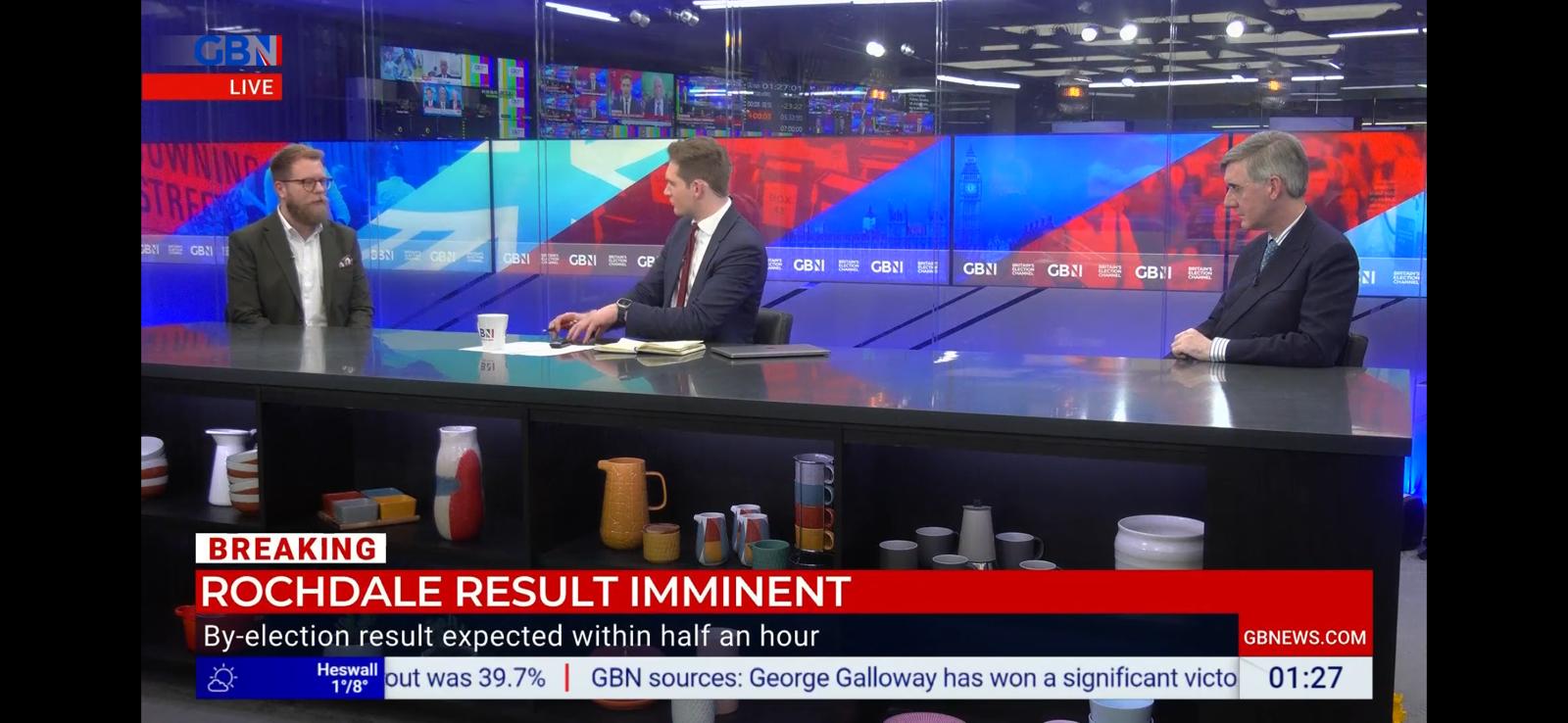
Chris Hopkins
Political Research Director
01/03/2024
10 takeaways from Rochdale
- Let’s start, as ever, with the results, and a particularly remarkable set of by-election results at that. George Galloway’s Workers Party of Great Britain has stormed to victory in the Rochdale by-election, taking almost 40% of the vote, on roughly 40% turnout. A local independent candidate, David Tully, came second, with around half the votes Galloway achieved, leaving the more established parties coming somewhere between 3rd and 6th. The other candidates, a smattering of independents, the Green Party candidate and the Monster Raving Loony Party candidate, all lost their deposits.
- All by-election results need to be taken with a pinch of salt, but this one needs to be taken with a truckload. The immediate “what does this result mean?” questions are inevitable, but in my view the answer is very little. This by-election was bizarre beyond recognition; of the established parties, Labour and the Greens effectively disowned their candidates, the Liberal Democrats had their own local campaign controversy, the Reform candidate was a disgraced former Labour MP, and the Conservative candidate took a holiday midway through the campaign. All of these factors have contributed, to some extent, to Galloway winning and an inexperienced independent coming second.
- But there are, of course, other factors that have led to a Galloway victory. His by-election and general election successes – of which this is the fourth distinct constituency he’s now represented in the UK Parliament – have generally come in constituencies with high proportions of Muslim voters. Galloway’s brand of politics, and the majority of his stances, are a direct plea to Muslim voters, and his ability to mobilise this group – not necessarily as a homogenous voting bloc, but certainly to his cause over that of other parties – deserves some credit.
- It cannot be the only group from which Galloway attracts voters, though. His oracy and anti-establishment schtick will certainly appeal to other voter types, including some that may find their more natural home at the more polar ends of the political spectrum. We’ve seen Galloway’s two distinct letters to voters in Rochdale; one directly to Muslim voters, and one to everyone else. What unites both letters, is both take the fight to Keir Starmer and the Labour Party; one on religious grounds regarding Labour’s stance on the Israel-Gaza conflict, and one on ‘culture war’ issues. The first words in his victory speech were “Keir Starmer, this is for Gaza.” He will definitely be out to make trouble for the Labour leader.
- On Labour, there are several questions to answer. The first, is that besides being a vocal voice in the House of Commons, what does Galloway’s victory actually mean for Labour? Personally, I don’t think Keir Starmer will be losing any sleep over this result. Indeed, all things considered, I don’t think Labour could have hoped for much from the result. Another question that will be posed will be “what would have happened if Labour selected a different candidate?” and I don’t think we can assume, based on these results, that a different Labour candidate who had been backed throughout the campaign would have just waltzed to an easy victory. A narrow Labour victory over Galloway, or even a defeat, with a different candidate, would have been far more humiliating than this one which Labour can effectively just write-off and move on from.
- The Conservative Party, too, won’t focus too much on this result. I don’t think there’s a real takeaway to have for the Tories here; they came third, on a much lower vote share than they achieved when coming second in 2019, but finishing above Labour, the Lib Dems and Reform I guess must be viewed positively. They will undoubtedly try to turn the attention to Labour and the problems Galloway poses Starmer’s party, and that makes sense; anything to distract from the fact that, Galloway or not, the Labour Party still lead the Conservatives by 18 points nationally and are seemingly on course for a huge majority at the next election.
- Nigel Farage and Richard Tice, the Honorary President and Leader of Reform UK, have spent much of their evening discussing how the rise in postal votes in Rochdale has caused “concern” and have implied that the results of this by-election were not “free and fair”. I’m no postal votes expert, and Nigel Farage has ran in enough by-elections to understand the mechanics infinitely better than I, but raising such matters has definitely distracted from Reform UK’s poor showing here; 6.3% of the vote is well below their national polling average, and coming in sixth has not provided any evidence that they’ve carried any momentum from their reasonable showing in by-elections just a fortnight ago. Farage has even speculated that they got their candidate selection wrong which, given how Simon Danczuk’s previous stint as the Labour MP in Rochdale ended, may be a fair assessment.
- Farage has also speculated that Galloway’s brand of politics could have a large electoral impact, causing Labour headaches in 20-30 seats with higher proportions of Muslim voters. Savanta polling has shown Labour on around 62% among Muslim voters, retaining around 75% of its 2019 vote. So, while the Labour Muslim vote has probably fallen, research from Professor Rob Ford suggests that the seats with the highest proportion of Muslim voters are so safely Labour, the drops in the Muslim vote that polling implies makes little difference to the constituency outcome. Of course, if George Galloway can all of a sudden manufacture 20-30 clones to stand in these seats with adequate resources to run a General Election campaign, then maybe he can pose Labour a serious threat. But realistically, Galloway is a bit of a maverick, a one-off, and has taken huge advantage of a non-campaign from the established parties in Rochdale. I’d be stunned if the Workers Party of Great Britain come in the top two of any seat in the UK – apart from perhaps where Galloway himself stands – at the upcoming General Election.
- Attention will now turn to Blackpool South, where we await confirmation of another Conservative by-election defence following Scott Benton’s suspension from the House of Commons. Normal service should be resumed there, where Labour, who last won the seat as recently as 2017, should take another Conservative scalp. Eyes will also be on Reform UK, following a decent showing by UKIP in the seat in 2015.
- A final word on David Tully, the independent candidate who came second in Rochdale. For an independent to come second, irrespective of the circumstances around the election, is a remarkable result for a local candidate. He campaigned on local issues with “no allegiance to any of the parties or any political views or opinions,” and hats off to him – a rare positive in what ended up being a fairly grisly campaign.
For more information on our polling capabilities please get in touch.





